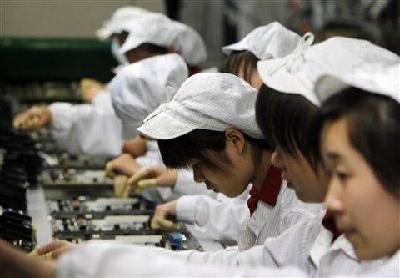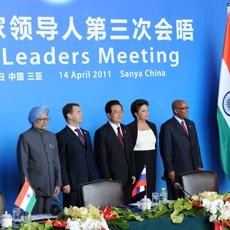
For decades, China's factories have supplied the world with cheap goods - from denim jeans to desktop computers. But export prices are expected to go up as Chinese manufacturers are battered by higher wages, more expensive raw materials and an appreciating currency.
iPhone to invest in Brazil

During her recent visit to Beijing, Brazil's President Dilma Rousseff said Foxconn International Holdings, the company that manufactures Apple's popular iPhone, plans to spend $12 billion building factories in her country.
For some time, Foxconn has been expanding outside of its traditional manufacturing base in southern China, shifting north to Hebei province, to cut costs. The company, which employs hundreds of thousands of workers in China, reported a loss for 2010 because of higher production costs.
Companies opt out
Companies increasingly are moving out of southern China's manufacturing hub in the Pearl River Delta as profits decline.
Stanley Lau is managing director of Renley Watch Manufacturing Company. He also heads the Pearl River Delta Council of the Hong Kong Federation of Industries.
"Wages are going up. The minimum wage has gone up by about 20 percent during the year 2010. And again this year wages have gone up by 20 percent roughly," said Lau. "When you look at any part of the world, I think you cannot find any other place with such kind of increase in wages."
What is more, he says, the cost of raw materials such as cotton, plastics and electronic components, is rising. Although the Chinese currency has been rising against the dollar, which could help ease rising costs for imported raw materials, manufacturers say even locally made materials are getting more expensive. China's inflation rate reached 5.4 percent in March, the highest in nearly three years.
At the same time, the yuan's appreciation, which the United States and other Western nations say is essential to reduce China's trade imbalance, makes Chinese products more expensive overseas.
Export prices to increase
Li and Fung, a Hong Kong sourcing company that supplies the US retailer Wal-Mart and other global retail chains, says Chinese export prices will increase as much as 15 percent this year. Company executives last month warned that Chinese goods are entering a new era of rising prices.
The challenges Chinese exporters confront are not new. They have been ramping up over the past two years. In 2008, China implemented a new law that increased factory workers' salaries. At that time, manufacturers warned that many of them would be forced to close because of rising wages.
Pansy Yau, deputy chief economist of the Hong Kong Trade Development Council, says Chinese exports have stayed strong since then.
"When we look at the share of China export in Europe and the [United] States, we find that the import share from China continues to increase. It proves that China is not only competing on cost because after all these years the wages in China are already higher than some Southeast Asian countries and other low-cost countries," said Yau.
The Chinese government has been encouraging manufacturers to move factories to poorer inland regions as a way to distribute economic development. Lau says not all industries can do so because they rely on the efficient supply chain in southern China, near other factories making needed components.
Southern China is blessed with deep ports that allow access for container ships bringing raw materials and carrying finished products to the rest of the world. Also, electricity and water supply are stable. Moving factories inland could prove costlier than staying put because companies may have to pay more in shipping costs.
Relocating to Vietnam, Indonesia
When it comes to moving overseas, the Federation of Industries' Lau says it will be easiest for textile manufacturers to relocate to places like Vietnam and Indonesia, because the infrastructure is already there.
"Years ago when they had a problem with the [export] quotas, many textile industries moved part of their production to these countries in order to get a better quota for their textile products," said Lau. "So there's a good set up in those countries. For the other industries like electronics, plastics, the watch and clock industries, it's more difficult because if you're going to move you need the whole supply chain to move together with you. You will have problems in the delivery of parts."
At the Hong Kong Trade Development Council, economist Yau says the pinch that Chinese exporters are feeling could well reverberate in supermarkets and shops across the world. She says it is inevitable rising costs will be passed on to customers.
"Once they can prove that their product is good and [has] value for money, then they have the bargaining power to ask for a price increase," added Yau.
Chinese government has made clear it wants to hold the line on prices - for goods sold at home and abroad. The government is working to tamp down inflation to make sure high prices for food and housing do not spark unrest. And Beijing has moved slowly on its pledge to let the yuan trade more freely - fearing that a sharp gain in the exchange rate could make exports even more expensive, forcing factories to close and eliminate jobs.
denim: a strong cotton fabric that is usually blue and is used for making clothes, especially jeans 藍粗棉布;勞動布;牛仔布
Foxconn urged to take better care of young employees
Labor shortage puts squeeze on Delta
China losing global labor advantage
(來源:VOA 編輯:崔旭燕)
